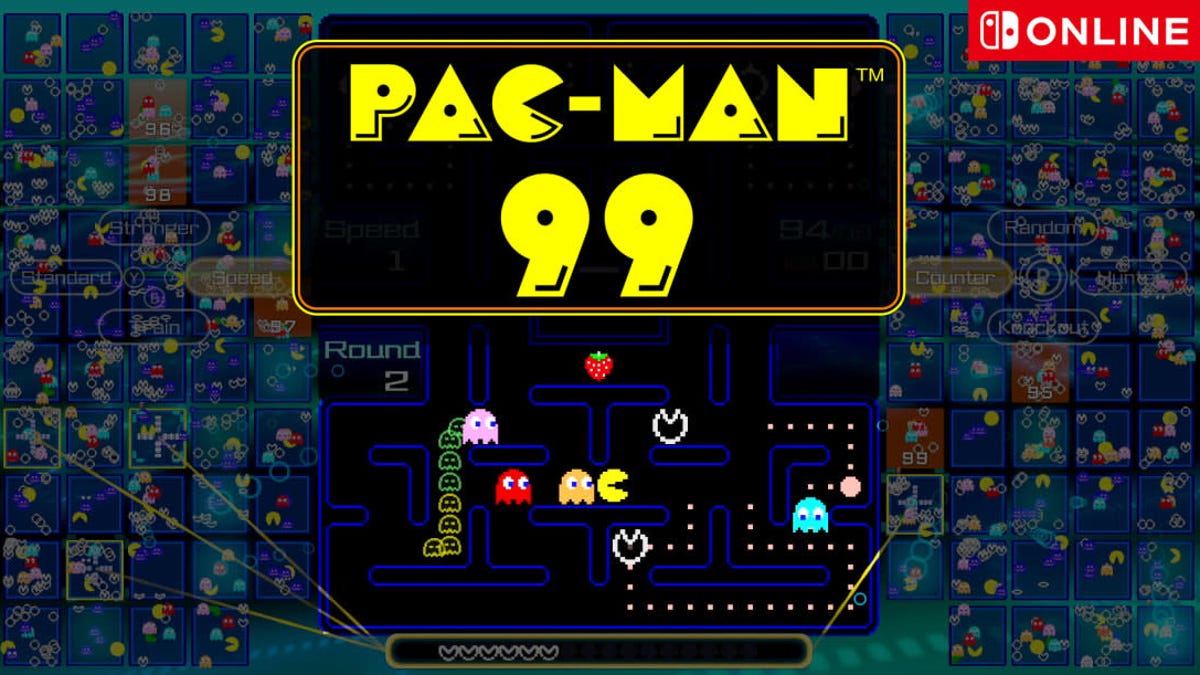8 Games to Play Before 'Final Fantasy XVI'
Final Fantasy XVI is one of the most-anticipated games of this year, but based on the latest hands-on impressions, it sounds like it will be a major change up for the long-running RPG series.Read more...
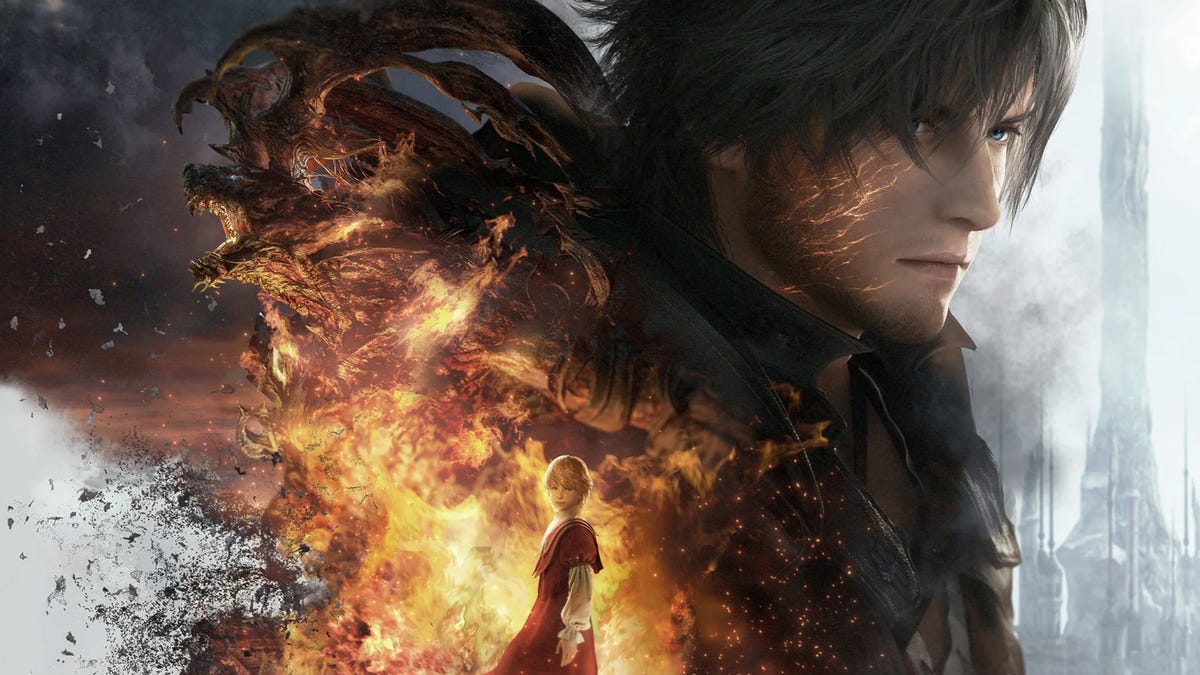

Image: Square Enix
Final Fantasy XVI is one of the most-anticipated games of this year, but based on the latest hands-on impressions, it sounds like it will be a major change up for the long-running RPG series.
Final Fantasy XVI’s new direction has raised plenty of questions for die-hard fans and newcomers alike. Will its mature rating fit with the rest of the series? Can an action game really feel like a true Final Fantasy?
While we can’t answer these questions until we play Final Fantasy XVI for ourselves, we can look to some other games made by key members of the development team, as well as games that Final Fantasy XVI pulls direct inspiration from, to get a better idea of what to expect when the game launches on June 22, 2023.
Whether you’re eager to see what Final Fantasy XVI’s team has made before, or you’re skeptical of the new direction and want an idea of what to expect, here are eight games to play ahead of Final Fantasy XVI—and I don’t just mean replaying all the numbered Final Fantasy games (though you should absolutely do that if you have the time and interest).
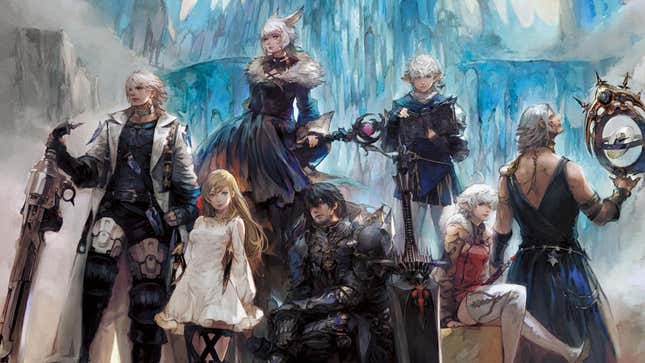
Image: Square Enix
Available on: PC, PlayStation 5, PlayStation 4
Final Fantasy XIV is the most obvious place to start. Many of Final Fantasy XVI’s lead developers also worked on this long-running MMO, including producer Naoki Yoshida (aka “Yoshi-P”), musical composer Masayoshi Soken, and art director Hiroshi Minagawa, among others. As such, there are obvious similarities in the art direction and high fantasy themes of both games.
However, since Final Fantasy XIV is an MMORPG and Final Fantasy XVI is a single-player action RPG, the gameplay experiences will differ drastically. And, like all mainline Final Fantasy titles, their stories and worlds are completely separate aside from series-staple elements like giant crystals, magical powers, and familiar creatures like Chocobos and Moogles.
Despite those differences, Final Fantasy XIV is worth playing ahead of Final Fantasy XVI to get a sense of the team’s storytelling and design philosophy, especially if you’ve never tried the game before. FFXIV is also a giant game that can last you hundreds of hours and will fill the remaining time before FFXVI drops, and you’ll experience some of the most celebrated storylines in the series. The full game costs $60 and requires a $15 monthly subscription, but there’s a free trial available that lets you play up to level 60.
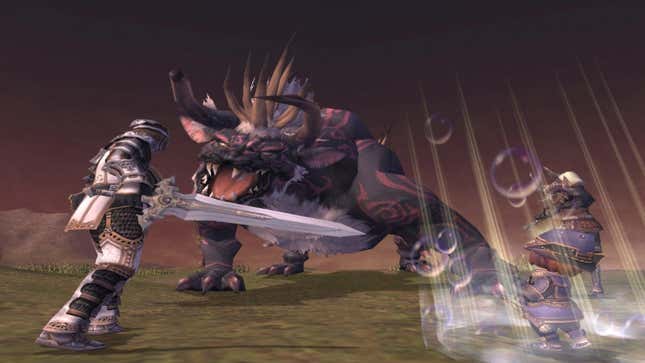
Image: Square Enix
Available on: PC
If you’ve already played Final Fantasy XIV, or you want to see what Square Enix’s other successful Final Fantasy MMO was like, Final Fantasy XI is absolutely worth playing. Despite its age, Final Fantasy XI’s retail servers are still up and running on PC, with millions of active players.
It takes patience to get into FFXI these days, but if it clicks, you’re in for one of the most immersive experiences in the entire series (trust me). As for its connections to FFXVI, FFXI features a dark, politically-driven storyline similar to what we’ve seen from FFXVI’s trailers—and something FFXIV players will appreciate.
Final Fantasy XIV players will also recognize XI’s many playable races and job classes, all of which were the bedrock of Final Fantasy XIV’s world. However, the gameplay is entirely different despite both being MMOs. FFXIV emphasizes clear goals through questing and instanced dungeons, whereas Final Fantasy XI is more like a sandbox where your objectives aren’t always linear. Traveling the world can be long and dangerous—not to mention the combat, crafting, and character progression systems are entirely different. There’s still a main story in FFXI (and it’s woefully overlooked by series fans), but experiencing that content requires more patience and teamwork. Luckily, much of the game is now solo-friendly, and AI party members can stand in for other human players if you need them.
While FFXI still requires a monthly subscription to play (starting at $12 per month), it’s often discounted on Steam, and new players get a free month to try out the game. And hey, if you used to play the game on Xbox 360 or PlayStation 2, there’s an online tool to help you recover your old account and character data.
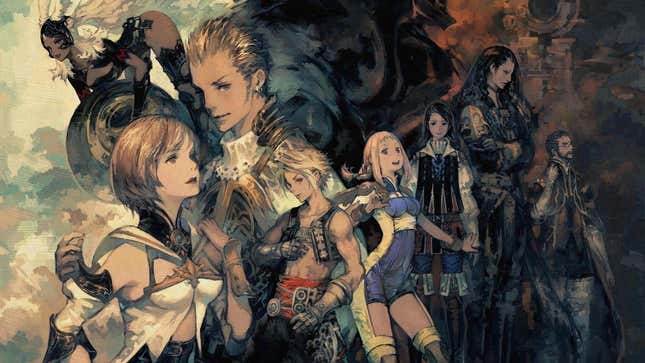
Image: Square Enix
Available on: PC, Nintendo Switch, PS4, Xbox One
While one could suggest just about any of the previous 15 Final Fantasy games, Final Fantasy XII is the only mainline, single-player entry we’re including on this list. It might not be every Final Fantasy fan’s first pick (unless you’re like me and think it’s the best in the series), but Final Fantasy XVI’s producer, Naoki Yoshida, is a well-known fan of Yasumi Matsuno, Final Fantasy XII’s original director and the creator of the Ivalice setting where FFXII takes place.
Like Final Fantasy Tactics and other games set in Ivalice, Final Fantasy XII’s story deals with war and political strife—much like we’ve seen from Final Fantasy XVI. In fact, Final Fantasy XVI’s setting, characters, and art direction even feature homages to Ivalice’s many nations and characters.
There are also potential similarities in the gameplay of Final Fantasy XII and XVI. According to what we know about the game so far, Final Fantasy XVI will feature large explorable zones, monster-hunting side quests, and a globe-trotting adventure, all of which you’ll find in Final Fantasy XII. And while the combat systems are quite different, Final Fantasy XVI will also feature AI-controlled companions at various points throughout the game, somewhat like Final Fantasy XII’s gambit system.
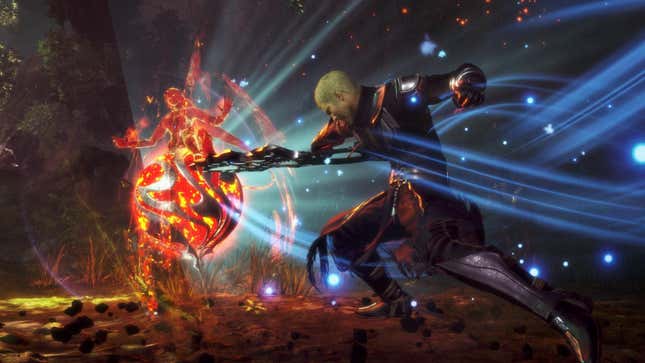
Image: Square Enix
Available on: PC, PlayStation 5, PlayStation 4, Xbox Series X/S, Xbox One
Final Fantasy XVI is notable for its more “western” take on fantasy and action-focused combat, but it’s not the only recent Final Fantasy title aimed at western audiences. Stranger of Paradise: Final Fantasy Origin is a prequel to the original Final Fantasy from 1987 co-developed by Team Ninja and Square Enix. Unlike the turn-based combat of classic Final Fantasies, Stranger of Paradise is a mission-based action RPG based on the gameplay of Team Ninja’s popular Nioh series.
To be clear, we’re not saying Final Fantasy XVI will play much like Stranger of Paradise aside from the fact you control a single character in combo-heavy battles, and Final Fantasy XVI’s story seems much more grounded than Stranger of Paradise’s frankly bonkers storyline and dialogue. Nevertheless, Stranger of Paradise offers a fast-paced action game with familiar Final Fantasy trappings that—at the very least—could satisfy your next-gen Final Fantasy cravings, especially if you find a few friends to play it with while waiting for Final Fantasy XVI.
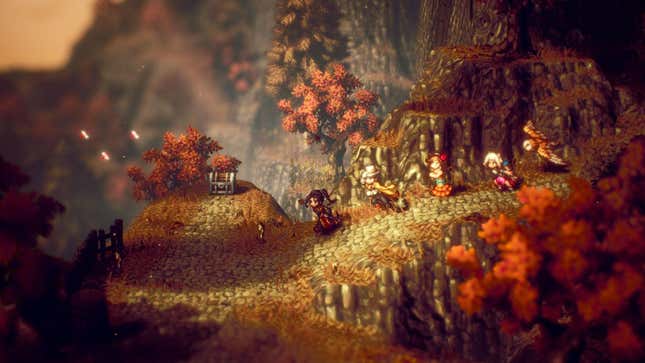
Image: Square-Enix
Available on: Nintendo Switch, PC, PlayStation 5, PlayStation 4
This recommendation is less about experiencing what Final Fantasy XVI might be like rather than what Final Fantasy XVI will definitely not be like.
Final Fantasy XVI seems to take the series the farthest from its console RPG roots yet. To be fair, the series has been on this path since Final Fantasy X was released in 2002, but if you’re disappointed by the Final Fantasy series dropping much of its traditional RPG mechanics—like turn-based battles and multiple party members—in favor of cinematic presentation and flashy real-time action combat, you’re not alone.
Luckily, Square Enix still makes games in the classic RPG style. The most recent is Octopath Traveler 2, which features a gorgeous “modernized” pixel art style, strategic turn-based battles, and lots of systems to tinker with. The first Octopath Traveler is also worth playing, though their storylines are entirely separate, so you can jump right in with 2 if you prefer.
There are plenty of other games to scratch that turn-based itch as well, including the Bravely Default series on Nintendo Switch and 3DS, Live A Live on Switch, and Dragon Quest XI on Switch, PC, PS4, and Xbox One.
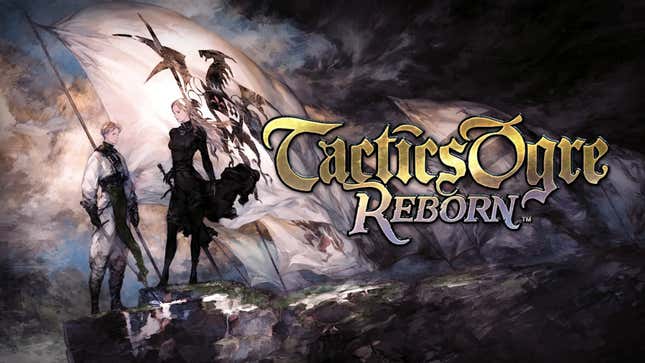
Image: Square Enix
Available on: Nintendo Switch, PC, PlayStation 5, PlayStation 4
As I mentioned earlier, Final Fantasy XVI producer Naoki Yoshida is an admitted Yasumi Matsuno fanboy. Yoshida’s games often take narrative, artistic, and thematic inspiration from Matsuno’s, and I would recommend anyone interested in FFXVI’s story to seek out Matsuno’s work. Luckily, one of Matsuno’s best games, Tactics Ogre: Let Us Cling Together, was recently remade for PC, Nintendo Switch, and PS5/4 as Tactics Ogre: Reborn.
Tactics Ogre: Reborn’s writing and deep tactical battles easily make this a must-play, but it’s also directly tied to Final Fantasy XVI’s lineage. Matsuno and his team would eventually convert many of Tactics Ogre’s systems into Final Fantasy Tactics, one of the most celebrated Final Fantasy spin-offs thanks to its deep tactical gameplay. Ivalice—the fictional world where Final Fantasy Tactics and Final Fantasy XII take place—was also inspired by the War of the Roses, the real-world medieval war that also inspired George RR Martin’s Game of Thrones. And both Game of Thrones and Ivalice are major inspirations for Final Fantasy XVI’s story and setting. You probably see where I’m going with this.
Unfortunately, Final Fantasy Tactics is hard to play these days. There are rumors of a remake, but the best way to play is the port on Android and iOS. On the other hand, Tactics Ogre: Reborn is easily available on modern consoles and PC, and offers similar medieval tactical warfare and political drama as FFT (some even argue it’s the better game overall) making it a great way to find out why Yoshida likes Matsuno’s games so much.
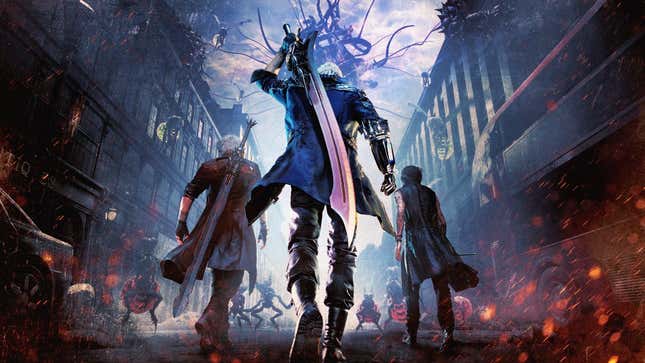
Image: Capcom
Available on: PC, PlayStation 5, PlayStation 4, Xbox Series X/S, Xbox One
So far, we’ve looked at games that share aesthetic and thematic similarities to Final Fantasy XVI, but few that we can safely say will play like Final Fantasy XVI, which is probably what fans are most curious about. Other Final Fantasy games experimented with real-time combat, but Final Fantasy XVI is the first mainline Final Fantasy game to feature fast-paced action combat where you control just a single character rather than a full party of comrades. It’s a major change for the series, but there are a few games out there that can give us a hint of how it might play, one of which is Devil May Cry 5.
Devil May Cry 5 and Final Fantasy XVI share the same combat director, Ryota Suzuki, meaning DMC5 offers a better sense of how FFXVI will actually play than any other game on this list. Suzuki worked on several other Capcom action games, but the Final Fantasy XVI team sought out Suzuki specifically for his work on Devil May Cry 5.
To be fair, Devil May Cry 5 is a standard character-action game lacking many of the RPG elements we expect Final Fantasy XVI to include, and its story and setting are radically different than Final Fantasy XVI’s epic medieval fantasy world. Nevertheless, DMC5’s visual flare and focus on controlling a single character in fast-paced action battles carry over to Final Fantasy XVI, and recent preview coverage favorably compare the two games.
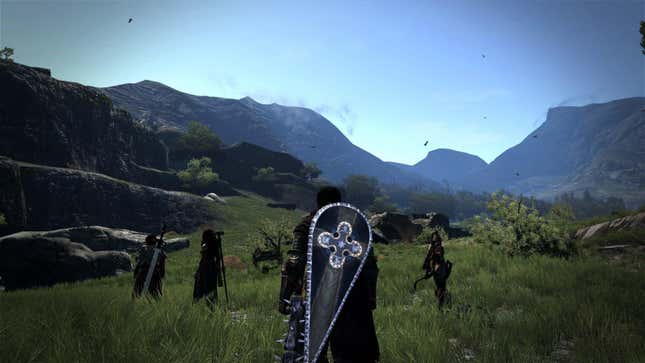
Image: Capcom
Available on: Nintendo Switch, PC, PlayStation 4, Xbox One
Devil May Cry 5 might be our best hint at how Final Fantasy XVI’s battle system will play, but Dragon’s Dogma: Dark Arisen is—potentially—a more holistic preview of what the next Final Fantasy has in store.
Like Final Fantasy XVI, Dragon’s Dogma is a high-fantasy action RPG that takes heavy inspiration from western medieval fantasy and classic PC RPGs. They also feature similar gameplay concepts, like AI-controlled companions and monster-hunting side quests. And, most importantly, both games feature real-time combat systems developed by Ryota Suzuki.
Like any game on this list, Final Fantasy XVI is sure to differ quite a bit. One notable difference is that Dragon’s Dogma is fully open-world with a lighter focus on story, while Final Fantasy XVI is a more directed experience similar to the recent God of War Ragnarok, according to producer Naoki Yoshida. (Go ahead and jot down God of War 2018 and God of War Ragnarok as bonus recommendations for this list.)
Dragon’s Dogma is also pretty long in the tooth. It originally launched on the PS3—and it looks like it—but has seen multiple ports to newer platforms that add new content and quality of life changes. The upshot is it’s pretty cheap and available on just about any console you own. If Final Fantasy XVI has you itching for an epic fantasy RPG with flashy action combat right this moment, Dragon’s Dogma: Dark Arisen is by far your best option.

 Tfoso
Tfoso 







